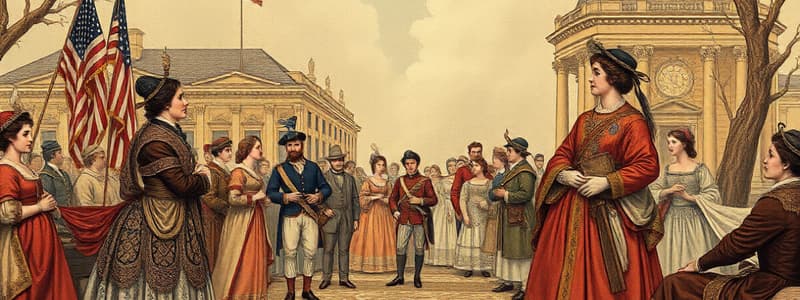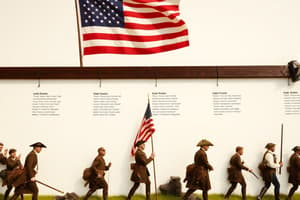Podcast
Questions and Answers
What was one of the major acts that contributed to the growing tension between American colonists and the British government?
What was one of the major acts that contributed to the growing tension between American colonists and the British government?
- The Coercive Acts
- The Stamp Act (correct)
- The Quartering Act
- The Navigation Acts
How did France contribute to the American Revolutionary War?
How did France contribute to the American Revolutionary War?
- By sending diplomatic envoys to negotiate peace
- By providing military support and resources (correct)
- By imposing a blockade on American ports
- By declaring war on Britain early in the conflict
What was a key weakness of the Articles of Confederation?
What was a key weakness of the Articles of Confederation?
- Inability to levy taxes effectively (correct)
- Strong federal control over state governments
- Established a single executive branch
- Mandated equal representation for states
Which document comprises a series of essays advocating for the ratification of the Constitution?
Which document comprises a series of essays advocating for the ratification of the Constitution?
Which Supreme Court case highlighted the debate over implied powers within the federal system?
Which Supreme Court case highlighted the debate over implied powers within the federal system?
Flashcards
What sparked the American Revolution?
What sparked the American Revolution?
Acts like the Stamp Act and Townshend Acts imposed by Britain on the colonies, causing resentment and fueling the desire for independence.
Why was foreign involvement important in the American Revolution?
Why was foreign involvement important in the American Revolution?
France's support was crucial for the American victory. Their military aid and naval forces helped tip the balance in favor of the colonists.
What was the main conflict between Federalists and Anti-Federalists?
What was the main conflict between Federalists and Anti-Federalists?
A key debate centered around how much power the central government should have. Federalists favored a stronger central government, while Anti-Federalists pushed for more state power.
Why was the Articles of Confederation replaced?
Why was the Articles of Confederation replaced?
Signup and view all the flashcards
What did the McCulloch v. Maryland case demonstrate?
What did the McCulloch v. Maryland case demonstrate?
Signup and view all the flashcards
Study Notes
Unit 3 - American Revolution and Early Government
- French and Indian War (Seven Years' War): Began with small conflicts, grew into larger conflict, Britain won, Canada and Florida, Spain received Louisiana.
- Treaty of Paris (1763): Ended the war, shifting control of land.
- Navigation Acts and Taxation: Colonists were upset by British laws and taxes like the Stamp Act and Townshend Acts due to lack of representation.
- American Revolution: Colonists revolted against British rule, seeking independence; Declaration of Independence.
- French Alliance: Americans received support from France, crucial for victory.
- American Victory: Resulted in independence from Britain
- Articles of Confederation: First government, but it created a weak central government; many problems due to the lack of a strong centralized leadership.
- The Federalist Papers: Wrote to convince people to ratify the US Constitution.
- The Constitution: Created a strong central government with three branches; Federalists wanted it to be powerful.
- Anti-Federalists: Opposed stronger central government; feared it might be too strong.
- Bill of Rights: First ten amendments to the Constitution; addressed citizen rights, limiting government power.
- Necessary and Proper Clause: Gives Congress implied powers, so they can expand their function based on what's "necessary" to run the country.
- McCulloch v. Maryland: Supreme Court case establishing Congress' implied powers.
Studying That Suits You
Use AI to generate personalized quizzes and flashcards to suit your learning preferences.




